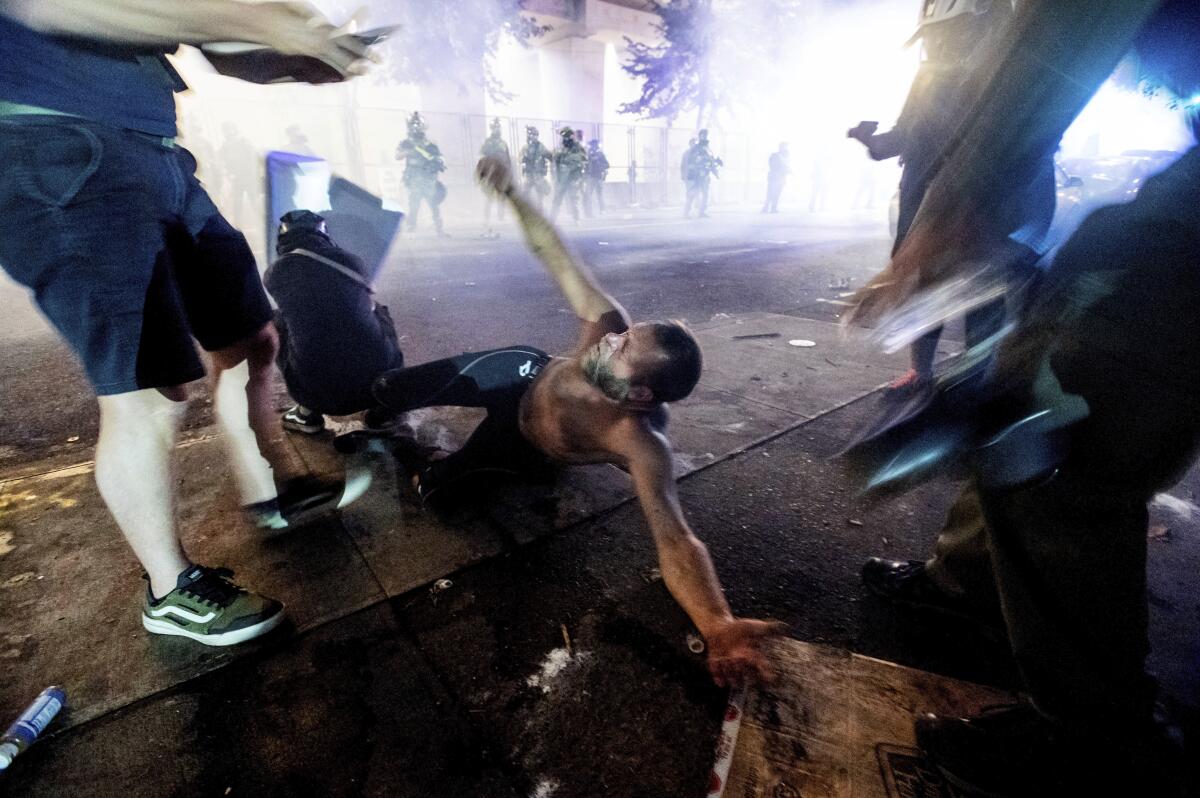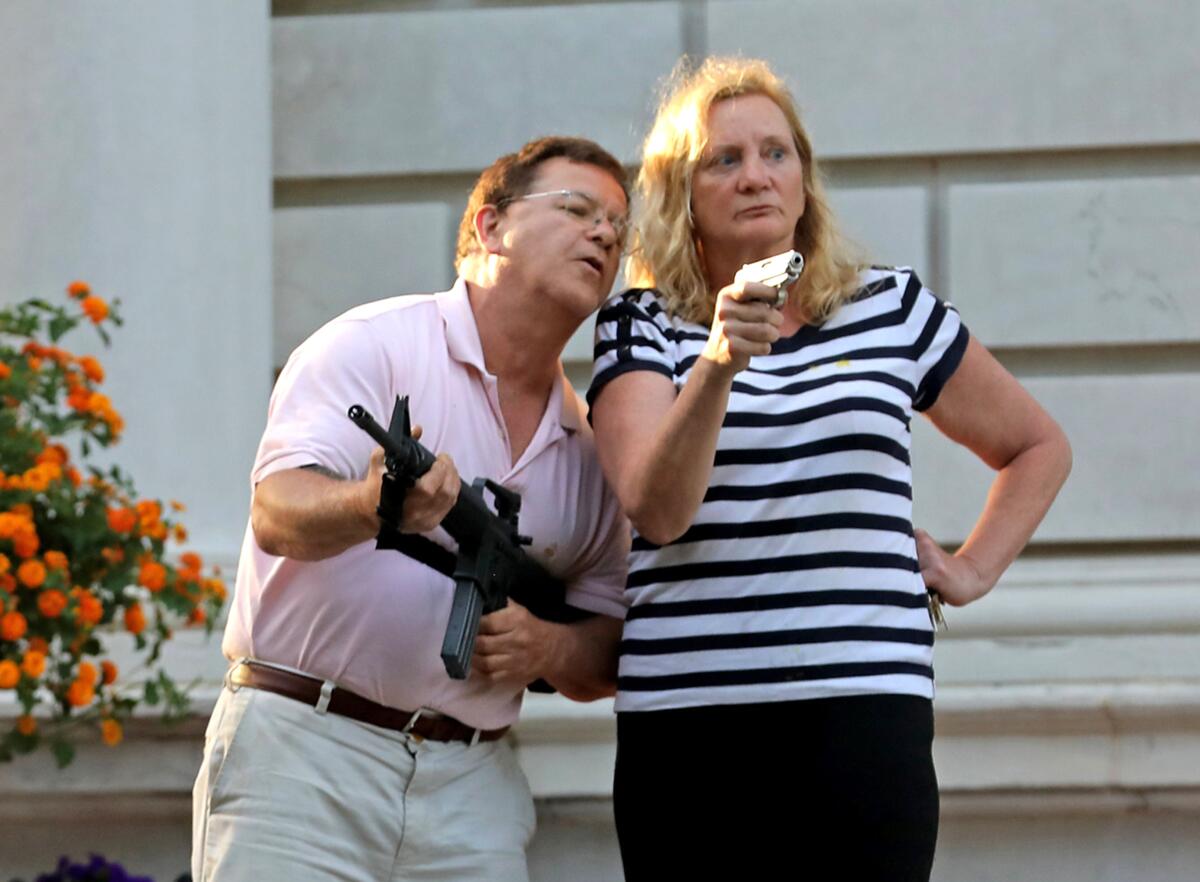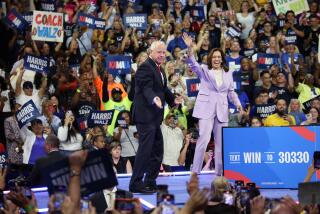Republican convention: GOP mines urban unrest to get white suburban votes

- Share via
WASHINGTON — In an election in which the vast majority long ago made up their minds, Democrats and Republicans each opened their conventions fishing for the same group of swing voters, but offering very different lures.
The voters open to persuasion at this point are mostly disaffected Republicans and wavering independents who may have approved of President Trump in February, but turned against him this spring.
Democrats pursued them with a parade of Republican ex-officials and an emphasis on Trump’s failure to control the COVID-19 pandemic. Republicans have countered, especially on their convention’s first night, with repeated images of crime and urban unrest.
Polling by both sides indicates that the crime issue could move some voters — especially older, white voters angered by Trump’s mishandling of the pandemic, but still suspicious of Democrats. Moving enough to matter will be difficult, however, so long as the pandemic dominates voters’ attention.
Both sides know that many of those voters are especially susceptible to arguments about safety and security.
In his convention speech last week, Joe Biden aimed directly at that concern, accusing Trump of having “failed in his most basic duty to this nation. He failed to protect us.”
Republicans portray Biden and the Democrats as the ones who will put voters at risk. Trump and his allies frequently return to his claim that Democrats pose a threat to suburbs, where many swing voters live, and to “the suburban housewife.”
Monday night, the St. Louis couple who achieved fame among conservatives this summer by brandishing guns at Black Lives Matter protesters in their neighborhood provided a clear distillation of the argument.
“It seems as if the Democrats no longer view the government’s job as protecting honest citizens from criminals, but rather protecting criminals from honest citizens,” declared Mark McCloskey, who along with his wife, Patricia, faces felony weapons charges for waving guns at the protesters who marched past their home.

“They’re not satisfied with spreading the chaos and violence into our communities. They want to abolish the suburbs altogether by ending single-family home zoning,” added Patricia McCloskey. That, she said, would “bring crime, lawlessness and low-quality apartments into now-thriving suburban neighborhoods.”
“These are the policies that are coming to a neighborhood near you” if Biden becomes president, she warned.
Tuesday night, Trump’s son Eric followed a similar line, falsely accusing Biden of wanting to “defund and disrespect our law enforcement.”
For Republicans, an emphasis on urban disorder and racist fears of Black people moving into largely white neighborhoods is a familiar play. It has boosted the party’s candidates at least since President Nixon’s “law and order” campaign in 1968.
In 1988, a heavy emphasis on crime helped then-Vice President George H.W. Bush, the Republican nominee, overcome the early lead held by Democratic Gov. Michael Dukakis of Massachusetts.
This time around, Republican officials say they believe that months of protests against abusive policing, some of which have been violent, as well as a spike in shootings in some cities, have once again given them an opening.
The times are very different now — many fewer voters are undecided than was case in 1988, for example, and partisan lines have hardened, but the issue could still play a dual role in helping Trump get back into contention.
Tying the Democrats to crime and urban unrest can motivate core Republican voters, who are overwhelmingly white residents of rural areas or fringe suburbs and often highly inclined to a negative view of cities and their residents.
Activating supporters — getting them not only to vote, but to work to persuade others to do so — serves as one of the key functions of a political convention.
A recent poll by the nonpartisan Pew Research Center found that “violent crime” ranked as the second-most-important issue to Trump supporters, just behind the economy. The top issues for Biden supporters, by contrast, were healthcare, the coronavirus and racial and ethnic inequality.
In addition to getting supporters revved up, the emphasis on crime could be a key to winning back suburban voters who deserted Republicans in the 2018 midterm election and are at risk of doing so again this year, said North Carolina Republican Party Chairman Michael Whatley.
“There’s a very, very visceral reaction to the riots and the vandalism and the looting,” Whatley said late last week.
“The Democrat efforts to defund the police is wildly unpopular all across the state,” he said. “Urban, suburban and rural doesn’t matter. There’s just a huge negative reaction to that.”
Biden has repeatedly said that he opposes defunding police departments — and even activists disagree about what the slogan would entail in practice — but Republicans have continued to portray it in the most negative light. They’ve argued that whatever Biden’s personal views, if elected he’d be captive to the party’s left wing.
“Last time, Joe’s boss was Obama. This time, it would be Pelosi, Sanders and the Squad,” former South Carolina Gov. Nikki Haley said Monday night, referring to House Speaker Nancy Pelosi of San Francisco, Sen. Bernie Sanders of Vermont and the group of four progressive female members of the House, including Reps. Alexandria Ocasio-Cortez of New York and Ilhan Omar of Minnesota, who have become favorite targets of conservative attacks.
Even before the conventions began, those sorts of arguments may have caused Biden’s standing among some older white voters to begin to erode, although his overall lead over Trump has remained robust.
Veteran Democratic pollster Stanley Greenberg found in a mid-August poll for Democracy Corps that while Biden’s overall lead over Trump had expanded, he had suffered a significant slip during the summer among white voters older than 75, going from a lead in May to a small deficit on the eve of the conventions. He suffered a smaller decline among older members of the baby boom generation. Those drops were offset, however, by growing support for Biden among millennials, the poll found.
The crime issue “is pulling him down some,” Greenberg said. For voters who are turning, “the trigger is the argument that protests are getting out of control.”
The problem for Republicans, Greenberg said, is that “other arguments are playing a much bigger role,” especially the COVID-19 pandemic, which has killed more than 178,000 people in the United States. That’s “a life-and-death issue” that has “had a huge impact on families,” he said.
And if the campaign debate begins to move away from that, Trump has multiple other vulnerabilities on issues such as healthcare.
“Crime and cultural issues provide some openings for Republicans,” Greenberg said. “But there are so many issues on which Biden can come back on those voters.”
Times staff writer Noah Bierman contributed to this report.
More to Read
Get the L.A. Times Politics newsletter
Deeply reported insights into legislation, politics and policy from Sacramento, Washington and beyond. In your inbox three times per week.
You may occasionally receive promotional content from the Los Angeles Times.











